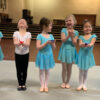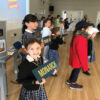by Richard Taylor-West
Headmaster, Shoreham College
Being challenged as individuals, in terms of learning, is immensely important for children. Gone are the days of Victorian desks, row on row, with pupils passively learning everything by rote to be regurgitated later. We no longer, in spite of Mr Gove’s recent reforms, shout “Fact, fact, fact!” at the pupils and expect a response, as Mr Gradgrind does in Dickens’ novel Hard Times.
There is a place, of course, for learning the facts; in some cases it’s absolutely necessary. We cannot shy away from that. There are types of mathematics that need to be memorised; there are scientific formula to learn and getting on in Spanish is not possible if the vocabulary is not captured and stored in the long-term memory.
There are though other ways to learn and it’s important that these are explored in schools. Learning should be like a mixed diet of fruit, carbs and vegetables. The antidote to the grind of memorisation is independent learning and good educational institutions have been doing this for some time.
I am particularly pleased to say that our pupils in our primary section, the Junior School, are adept independent learners and the staff are always setting them some quite tricky tasks to complete. We call these ‘challenges’ and we mean what we say on the tin. They are meant to be quite difficult to tackle.
The secret to an effective task is, of course, how it is set up in the first place. The theme or topic chosen should be exciting, leave room for discovery, within an age appropriate way, but have a clear set of criteria that the pupils understand are able to work towards. They may, in that case, tackle the tasks in their own way, but can achieve a great deal and have a sense of a destination point.
In our Junior School, we ask our pupils to be resourceful, mature thinkers who practise something often known as growth mind set. They are given key starting points, a set of pointers in terms of resources and then they are expected to go on a journey of learning. Will it be easy? No, of course not. We then expect them to grapple with ideas, to tackle tricky topics and to reflect on their learning journey along the way. We expect them to challenge themselves and say, “I can do this, even if it’s hard.”
We have had many challenges in our junior school; there’s usually one per term. We have seen them tackle ‘S for Seeds’ when they looked scientifically at the life-cycle of seeds, but how was largely up to them. We have asked them to choose a country, for ‘All Around the World’, and put together work that explores culture, language, culinary traditions and more. One of the key instructions in the project was: “You need to choose one country to research that you have not already covered at school.”
This outlines one of the key functions of this kind of work: the pupils are taken way beyond the dryness of SATS, which we do not do, and they are allowed the space to take ownership of their work and the direction they wish to take their work in. This is all about widening our pupils’ frames of reference and engaging them in the wider world which is key to our ethos as a College.
Organising and marking this kind of work is, of course, tough for the staff too. It’s not straightforward but it is most certainly worth it. These kinds of independent learning challenges, with elements of self-reflection and growth mindset at their core, are a little more complex than the old school project that I did in 1976. For a start, no one actually told me why I was doing it. There wasn’t anything like the same ownership of ideas. I did it because a teacher said so. Hmmmm. Only now, many years later, do I have sense of why. We are more explicit about this now and the pupils appreciate this.
One of my favourite junior challenges was set for our pupils this term: “Mindfulness and Happiness”. One suggested task was: “Write a set of instructions or recipe for happiness”. This might challenge many adults, in terms of planning and thinking. I, however, was treated by a Year 5 pupil to an expertly made film – an edited montage of powerful images of family, experiences, places and loved ones. The level of thought that had gone into the piece truly amazed me. It was also my hope, of course, given that one in 10 young people these days struggle with mental illness, that the young man in question will have learned a great deal about himself and achieved a degree of mindfulness that might not have been possible without the task he was set.
Challenge tasks such as these are much more than just about facts, or numbers. They are an opportunity for pupils to be enriched – and I must admit this was a word that used to make me cringe a little back in the 90s. Less so now. Living in an age of 20 second sound bites and Snapchat moments, there is a great deal to be said for being immersed in a task that takes one or two weeks to complete and being mindful in that moment too. More of the snail than a hare – but that’s another project I could write about, if I had the space.
Please call 01273 592681 to find out more about what Shoreham College can offer you, or to arrange a personal visit at any time of the school year.
www.shorehamcollege.co.uk










